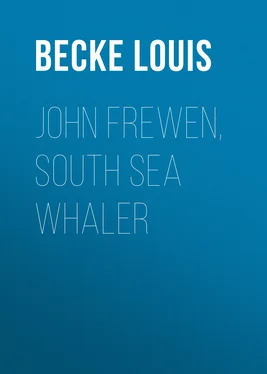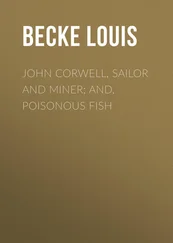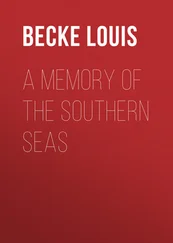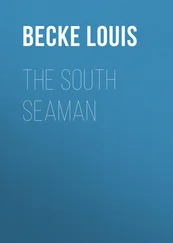Louis Becke - John Frewen, South Sea Whaler
Здесь есть возможность читать онлайн «Louis Becke - John Frewen, South Sea Whaler» — ознакомительный отрывок электронной книги совершенно бесплатно, а после прочтения отрывка купить полную версию. В некоторых случаях можно слушать аудио, скачать через торрент в формате fb2 и присутствует краткое содержание. Жанр: foreign_prose, literature_19, foreign_antique, на английском языке. Описание произведения, (предисловие) а так же отзывы посетителей доступны на портале библиотеки ЛибКат.
- Название:John Frewen, South Sea Whaler
- Автор:
- Жанр:
- Год:неизвестен
- ISBN:нет данных
- Рейтинг книги:3 / 5. Голосов: 1
-
Избранное:Добавить в избранное
- Отзывы:
-
Ваша оценка:
- 60
- 1
- 2
- 3
- 4
- 5
John Frewen, South Sea Whaler: краткое содержание, описание и аннотация
Предлагаем к чтению аннотацию, описание, краткое содержание или предисловие (зависит от того, что написал сам автор книги «John Frewen, South Sea Whaler»). Если вы не нашли необходимую информацию о книге — напишите в комментариях, мы постараемся отыскать её.
John Frewen, South Sea Whaler — читать онлайн ознакомительный отрывок
Ниже представлен текст книги, разбитый по страницам. Система сохранения места последней прочитанной страницы, позволяет с удобством читать онлайн бесплатно книгу «John Frewen, South Sea Whaler», без необходимости каждый раз заново искать на чём Вы остановились. Поставьте закладку, и сможете в любой момент перейти на страницу, на которой закончили чтение.
Интервал:
Закладка:
“And likely to continue so for another three or four days, if I am any judge of the weather in this part of the Pacific,” said Frewen, “I agree with you. And now, before I begin to tell you the story of the mutiny, I want to know if you two will help me to recapture her? You are seamen, and—”
Both men sprang to their feet.
“Yes, we will!”
“Ah! I thought you would not refuse. Now wait a moment,” and calling to a young native who was near, he bade him go to the chief of Samatau and ask him to come to the house as quickly as possible.
“Malië, the chief of Samatau, will help us,” he said to Frewen; “he has two hundred of the best fighting men in Samoa, and I shall ask him to pick out fifty. But we want a nautical leader—some one to take charge of the ship after we get possession of her.”
“Now here is the story of the mutiny, told to me by poor Mrs. Marston.”
CHAPTER V
“At daylight this morning, my wife and I were aroused by our servants, who excitedly cried to as to come outside. A boat, they said, was on the beach with a number of white men in it, some of whom were dead.
“I went down to the beach at once, and five minutes later had all the unfortunate wounded and unwounded people assisted to the house, for they were completely exhausted by what they had undergone, and were also suffering from thirst. Two of their number had succumbed to their wounds in the boat a few hours previously, so Villari, the mate, told me. Marston, who had been shot in the neck, was unconscious, and his wife who, as you saw, is little more than a girl, was herself wounded in the arm by a musket ball.
“We did all that we could do, and after Mrs. Marston had had an hour’s rest, she and Villari told me their story.
“The Esmeralda is Marston’s own ship, and left Valdivia, in Chile, for Manila about seven weeks ago. She is almost a new ship, only having been built at Aberdeen last year. Marston, who had just married, brought out a general cargo from London to Valdivia and other South American ports, and sold it at a very handsome profit. Whilst on the coast, fever broke out on board, and he lost his second mate and five A.B.‘s, and the third mate and two others had to go into hospital. In their places he shipped a new second mate—a man named Juan Almanza—and twelve seamen, ten of whom were either Chilenos or Peruvians, and the remaining two Greeks. The former boatswain he promoted to the third mate’s birth. Almanza proved to be a good officer, and the new men gave him satisfaction, though his agent at Valdivia had urged him not to take the two Greeks, who, he said, were likely to prove troublesome. Unfortunately he did not take the agent’s advice, and said that he had often had Greeks with him on previous voyages, and found them very fair sailormen—much better than Chilenos or Mexicans.
“He had been paid for his cargo mostly in silver dollars, and the money was brought on board in as quiet a manner as possible, and he believed without the new hands knowing anything about it. Poor fellow; he was fatally mistaken! In all it amounted to thirty-five thousand dollars, and in addition to this there was a further sum of two thousand pounds in English gold on board—Marston, I must tell you, is, I imagine, a fairly wealthy man, for his wife told me that he had the Esmeralda built at a cost of six thousand pounds.
“He had been informed at Valdivia that a cargo of Chile flour, which could be bought very cheaply at Valparaiso, could be sold at a huge profit in Manila, and he thereupon bought a full cargo—six hundred tons—and sailed, as I have said, about seven weeks ago. All went well on board from the very first, although the English seamen did not much care about their foreign shipmates, who, however, did their duty after a fashion. Almanza, Mrs. Marston says, was in all respects an able and smart officer, and both she and her husband took a great liking to him—the scoundrel!
“The two Greeks—who, by the way, called themselves and shipped under the English names of John Foster and James Ryan—the Levantine breed do that trick very often—were in Almanza’s watch, as were six of the Chilenos; and the mate one night, coming on deck when it was his watch below, was surprised to find Almanza and the two Greeks engaged in an earnest conversation. His suspicions were aroused, and he reported the matter to the captain, who, however, made light of it, and said that Almanza had told him that Foster and Ryan had been shipmates with him on a Sydney barque some years before, and that it was only natural that Almanza would relax discipline a little, and condescend to chat for a few minutes with men who had sailed with him previously.
“Ryan, the older of the two, had proved himself an excellent seaman, and both Marston and Villari felt sure, from the way in which he spoke to the other seamen, that he had at one time been an officer. In addition to Spanish he speaks both English and French remarkably well, and his manners and personal appearance are extremely good, and no one would take him to be a Greek. He, however, frankly admitted that his name was not Ryan and that he was a native of the island of Naxos in the Ægean Sea.
“At this time, Mr. Frewen, the Esmeralda was near these islands—in fact, Upolu was in sight; and Marston, knowing that there were some Europeans settled at the port of Apia, on the north side of the island, decided to put in there for fresh provisions, of which the ship was in need.
“Perhaps his decision made the scoundrelly Almanza imagine that he suspected him, and was only touching at Apia to rid himself of his second officer and his Greek and Chileno accomplices, for Mrs. Marston—who shudders when she mentions Almanza’s name—says that shortly after the ship’s course was altered for Apia, he went for’ard on some excuse, but in reality to talk to the Greeks in the fore-peak. He was absent about a quarter of an hour, and then went about his duties as usual.
“A little before six bells, Captain Marston was on the poop looking at the land through his glasses, Mrs. Marston was in her cabin sewing, Villari, with the boatswain and three A.B.‘s (all Englishmen), were with the steward and third mate engaged in the lazzarette overhauling and re-stowing the provisions. Suddenly the captain was felled by a blow on the head dealt him from behind, and the mate and those with him were at the same moment ordered by Almanza to come up out of the lazzarette. He told them that he was in possession of the ship, and that they would be shot down if they attempted to resist. Villari and his men came up, and found the second mate and six of the mutineers in the cabin, all armed with pistols and cutlasses. Resistance was useless, and Almanza told Villari not to think of it. He (Villari) was then hustled into his own cabin and locked in, and the English seamen ordered on deck, where they, with the other Englishmen on board, were made to hoist out the longboat. Whilst this was being done Almanza, who had locked Mrs. Marston in her cabin, opened the door, and told her that she need feel no fear, but that she must come on deck to attend to her husband, who had been hurt She found Marston lying where he fell, and quite unconscious, with a Chileno standing guard over him. As the English members of the crew were hoisting out the longboat, Almanza told the steward—a negro—to get some provisions and some bottles of wine from the cabin. Then the two Greeks—who from the first had seemed bent on murder—interfered, and one of them suddenly raised his pistol and shot the unfortunate steward through the heart. The Chileno seamen applauded the act, and only Almanza’s frenzied protests prevented them from slaughtering the unarmed Englishmen, the Greeks declaring that they (the mutineers) were only putting ropes round their necks by sparing any one of them—including Mrs. Marston.
Читать дальшеИнтервал:
Закладка:
Похожие книги на «John Frewen, South Sea Whaler»
Представляем Вашему вниманию похожие книги на «John Frewen, South Sea Whaler» списком для выбора. Мы отобрали схожую по названию и смыслу литературу в надежде предоставить читателям больше вариантов отыскать новые, интересные, ещё непрочитанные произведения.
Обсуждение, отзывы о книге «John Frewen, South Sea Whaler» и просто собственные мнения читателей. Оставьте ваши комментарии, напишите, что Вы думаете о произведении, его смысле или главных героях. Укажите что конкретно понравилось, а что нет, и почему Вы так считаете.












